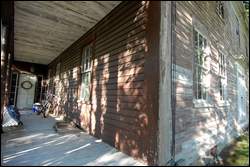Trustees in New Hampshire Are Attempting to Break Benefactor's Will in Order to Kick Out Cats from Their Home

"A house without a cat, and a well-fed, well-petted and properly revered cat, may be a perfect house, perhaps, but how can it prove its title?"
-- Mark Twain, Pudd'nhead Wilson
When Beatrice Rollins departed this veil of tears in 1996 she left money in her will for the care and maintenance of twelve cats that she had "collected" over the years. Now, trustees of her estate are plotting for financial reasons to do in the cats.
The dispute centers around two of Rollins' former properties that she made provisions for in her will. One of them is an ancient structure located at 44 Hampton Road in Exeter, New Hampshire which she wanted to be turned into a museum. The second home, which served as her primary residence, is located seventeen kilometers to the south in Salisbury, Massachusetts and is where the last of her five surviving cats now reside. According to the trustees, there are not sufficient funds remaining to keep both residences going.
The trustees accordingly want to get rid of the cats, sell the Salisbury house, and use the proceeds from the sale to convert the Exeter house into a museum. This underhanded maneuver would, however, require the approval of the Massachusetts Probate Court and this is unlikely because it is contrary to the explicit terms of Rollins' will.
According to the August 10th edition of Foster's Daily Democrat of Dover, New Hampshire, the will stipulates: "It is my wish that the domestic animals owned by me at the time of my death, with their offspring, shall be allowed to live out their natural lives and the proper provisions shall be made for their maintenance and well-being and that these animals be permitted to live and be cared for on my property." (See "Exeter Museum Waiting on Cats' Nine Lives to Run Out.")
The trustees are attempting to circumvent Rollins' wishes by proposing that the cats be removed from her residence and given to a "home for feral cats, where they would be domesticated and given new homes." There are, of course, sanctuaries for feral cats but domesticating ferals is problematic, especially since all the cats in question are at least ten years old.
At the Salisbury house, each of the large gray and white cats lives in a cage inside its own room. A renter who lives in the other half of the two-family house feeds, waters, and changes their litter boxes while a veterinarian visits once a year.
No information is available as to how much time the cats are allowed outside of their cages or even if they are allowed to socialize with each other or with humans. More importantly, it is not even clear from Greta Cuyler's rather convoluted writing in the Daily Democrat whether the cats are strays or ferals.
Most likely they are somewhere in between domesticated and semi-wild cats. Nonetheless, from the looks of things they are being held as virtual prisoners in their own home. A cage is no place for an animal.

There is about $75,000 left in the fund Rollins established for the cats and that should be more than sufficient to see them through the remainder of their lives. The Daily Democrat is silent on this issue but since there are only five cats remaining it is likely that they have either been sterilized or are kept segregated in cages in order to prevent them from multiplying.
This is in and of itself a violation of Rollins' wishes in that her will specifically makes mention of the cats' offspring. Of course, such measures would be entirely justified in order to prevent inbreeding and the corresponding genetic defects this causes.
The house in Exeter, which was built way back in the 1720s, is divided into two parts. The back portion has been renovated and converted into a rental unit that brings in an unspecified amount of revenue each year. In fact, it was these alterations that ate up most of the money that Rollins had bequeathed for the maintenance of the house. The front part, on the other hand, has not been occupied since 1956 and to venture inside is akin to entering a time machine. (See photos above and below of the exterior of the house.)
For instance, a kitchen calendar is dated 1955. A framed marriage certificate bears the date September 4, 1883. There is a hand-cranked washing machine and even a pot de chambre. The vacant portion of the house does not have either indoor plumbing, electricity, or insulation. The property taxes run $4,000 a year and there is only $16,000 remaining in the trust fund set up for the house.
The estate is not without historical significance, however. In addition to the old-fashioned furnishings found inside the main residence, a wheelwright's shop and a barn on the property are considered worthy of preservation.
Not only do the trustees want to get rid of the cats as soon as possible but they also have reservations about the financial viability of the proposed museum. "It would cost so much to bring it around and what's the hook?" Edward Rowan of the Fogge-Rollins Trust told the Daily Democrat. "You've got to have a lot of bells and whistles to get people into museums nowadays."
According to Rowan, the house in Exeter will most likely be sold with the proceeds going toward the upkeep and maintenance of the items deemed to be of historical value which would presumably then be either sold or donated to a museum. As for the house itself, the trustees could stipulate that its historical look be maintained but more than likely the most lucrative offers would come from developers who would want to raze it in favor of either condominiums or retail space.
"It'd be nice if something happens before the stuff (artifacts) deteriorates," Rowan added. "It ties our hands and it's not great for the cats."

From the sketchy details provided by the Daily Democrat it is impossible to accurately comment upon the financial status of the various accounts set up by Rollins before her death. Nonetheless, there does appear to exist a prima facie case for holding the trustees derelict in both their care of the cats as well as their stewardship of the house in Exeter.
In this light it is also important to remember that trustees do not work gratis; they get paid for their services and some of them raid the till as well. Rowan and his colleagues obviously do not care for the cats and see them only as a drain upon the trust's dwindling resources.
If the choice is between saving a few historical relics and the lives of five cats preference should be given to the cats. Not only is this what Rollins would have wanted but saving a life, animal or human, should always take precedence over material considerations.
Of more immediate concern is the present welfare of the cats. Either some animal rights group or the Probate Court should order an immediate inquiry into their well-being. If warranted, the court should take the unusual step of appointing a guardian to ensure that they receive the kind of care that their benefactor intended.
Photos: Aaron Rohde of Foster's Daily Democrat.

<< Home